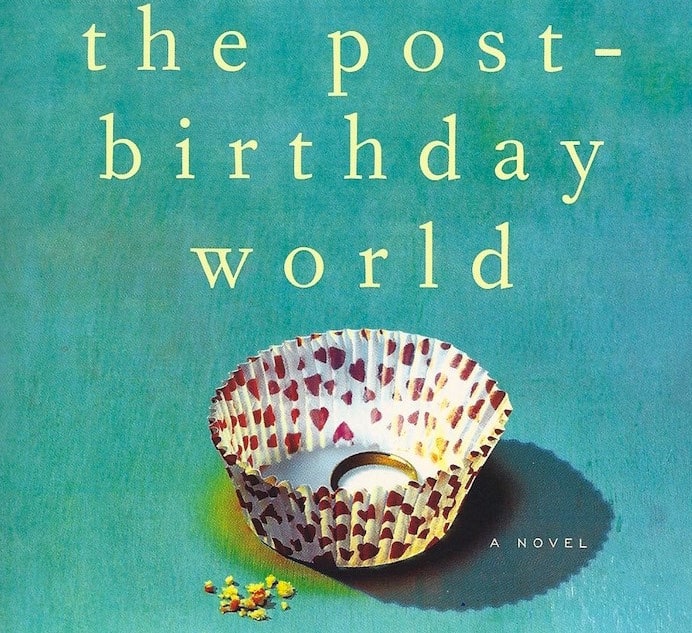It was a piece in The Guardian that led me to read Lionel Shriver‘s justly renowned novel The Post-Birthday World. In this richly imagined, cunningly plotted, and brilliantly realized “what-if?” novel, we meet Irina McGovern, a book illustrator pivoting between alternative possible realities involving two wildly different romantic attachments.
McGovern, an American living in London finds herself suddenly striken with the overwhelming desire to kiss snooker star Ramsey Acton after a night of dinner, drinks, and a joint. The book then tracks back to her life with snooker fan and policy wonk Lawrence Trainer, with whom Irina has lived for ten years of unwedded contentment. As we dive deeper into Irina’s longings, of various sorts, author Shriver offers us psychologically nuanced chapters in which the kiss had led to much more, with attendant complexity. In subsequent passages, Irina’s life with Lawrence has been shaded and varied to mirror what might happen next, in the post-kiss world. (The title alludes to the birthday dinner in which the kiss either happens, or doesn’t.)
Rare is the writer who can capture the interior mercurial mood swings of people in the thrall of a new physical passion. Nor can many flesh out the domestic key signature of a ten-year partnership.
“Hey!” He dropped his briefcase in the hall. “Where have you been all afternoon?”
“Oh,” she scrambled, “running a few errands.”
Wrong. People who have lived together for years were never “running errands.” She could have said she was at Tesco because they were low on Greek yogurt, or at the hardware store at Elephant & Castle because the lightbulb in the studio desk light had burnt out – that’s what you say to the man you live with. Because Irina knew all about the exactingly particular nature of domestic reportage, her failure to heed its form was tantamount to wearing a sandwich board that announced in big block letters, BEHOLD MY CHEATING HEART.”
I’m possibly the last English language reader to realize how famous Shriver is for another book— We Need to Talk About Kevin—made into one of those tightly knotted Tilda Swinton movies. But as far as I’m concerned, Shriver’s reputation will be deathless based upon this single book, The Post-Birthday World. Not only does she describe over-the-top domestic disagreements as well as the almost imperceptible minutiae of everyday meanderings with such complete confidence and precision that I pretty much decided against ever writing another word in the face of such mastery. Shriver is a virtuoso, and she writes about a world I know! Longings I’ve had, agonies of professional decision that have come my way more than once, and the ubiquitous suspicion that I am in love with two different people at the same time. She is the mistress of a world that resonates right down to my cellular structure. Let’s just say that she delivers more than I’d ever hoped for.
The Post-Birthday World is funny (laugh out-loud funny), erudite (thank god for wiki-dictionaries), and remarkably explicit about the sorts of sexual longings people—okay, women—actually have. I have rarely read such raunchy, pulse-pounding descriptions of lust, and never in a novel that qualifies as literature. How refreshing! I felt like a woman who’d just crossed the Mojave and was suddenly plied with glasses of sparkling water, a few gin and tonics, and one of those infinity pools.
With its masterful handling of the intertwining “two reality” plot—think Jonathan Franzen’s four-dimensional characters blended with Kate Atkinson’s time alterations—Shriver’s book is at its finest as a close reading of human tendencies, the good, the bad, and the regretted.
On desire:
Surely it was a relief that her flush of forbidden passion did not return. She should be grateful to feel little more than vague good wishes for his performances. The fact that Ramsey Acton was an attractive man had been safely restored to the abstract. In tandem, she was plagued by an enigmatic sense of loss. Usually one rues the fact that a desire has gone ungratified. Yet maybe the commodity more precious than its fulfillment, was the desire itself.
In one version of her future, Irina has left Lawrence and yet finds herself returning to their old apartment for sentimental visits. “On these surreptitious trips to Borough, Irina wasn’t really visiting Lawrence, but herself.”
And in yet another possible future twist, Irina meets Ramsey and his ex-wife at a party.
As they filtered toward the wine, she fell into step with Ramsey, and drew him aside. . . . “I’m surprised you’re back with Jude.”
“At my age, I’m too knackered to make a new mistake. It’s easier to make the same one.”
As I neared the end of this terrific ride, I began to tense up. How could she possibly end this with the same powerful stride that she’d used throughout the book? As I let myself read that last page, I grinned. Big grin. She’d done it. Avoiding chick lit cliché, avoiding treacle, avoiding operatic Disneyesque climax, she remained true to the restless self-assessments of her protagonist. It will be a bloody long time, as Irina might put it, before I find a book as compelling as this one. But, for the record, I’ve just begun Shriver’s We Have to Talk About Kevin. So I’ll get back to you.


